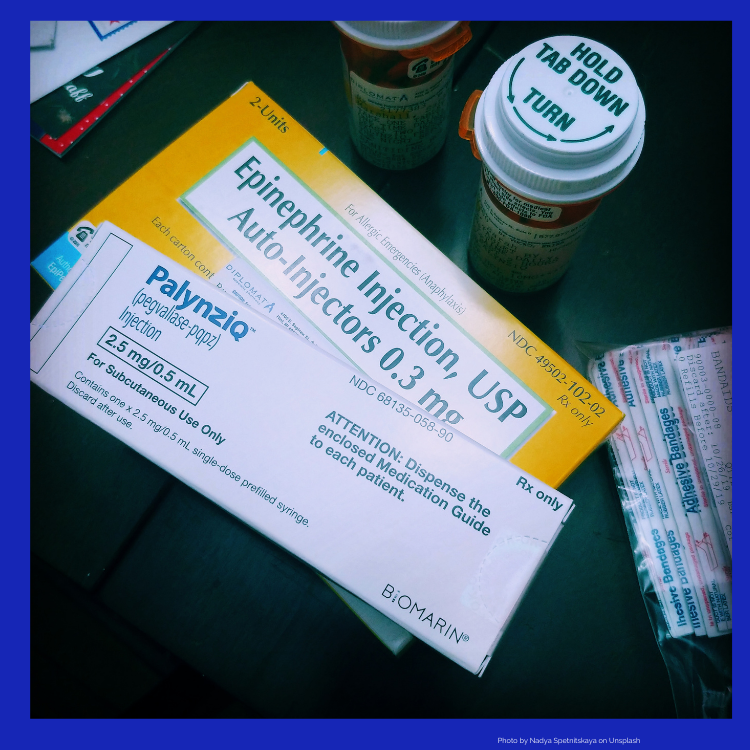
Just a few weeks ago, I passed my two-year anniversary of response to Palynziq. I responded quickly – details about my decision to try Palynziq and my medical transition can can be found here. But I still remember the phone call from my dietician when I learned my phe level had dropped. I had not been careful with the PKU diet in the weeks prior, but it was a 1.2 (or 7.2 if you track ml). My dietician explained they wanted one more filter card result before we would start changing my diet. A week later, the next level came back at 0.2. I was at work when I got the news, and I still remember sitting at my desk shaking. I knew a lot about my life was going to be very different. I had definitely responded to Palynziq!
There are two related questions I am frequently asked about Palynziq, and the answers to these questions probably encompass the two areas where I was most unprepared for the full impact of Palynziq. I knew that liberalizing my diet would have positive impacts on my social life, and it did. But food was a little trickier.
- Was it hard to get enough protein in the beginning? In the first few months, I was very afraid to eat protein. When my level came back low, I remember the first meal I prepared for myself was a plate of vegetables with about two tablespoons of black beans. But fairly quickly, I was feeling side effects of having levels below normal range (not everyone experiences this, but I did). I quickly felt like my body needed protein. The challenge was, and still is, adapting to HEALTHY protein sources. It was very easy to rely on protein shakes, protein bars, and other foods supplemented with protein. For example, it was not too hard to switch out low protein pancakes for protein pancakes, low protein pasta for protein pasta, or coconut milk yogurt for Greek yogurt. Changes to high protein versions of familiar foods was easy, but did not meet my new protein requirements in the healthiest way.
Tracking food is very intuitive, and eating to meet a ‘goal’ comes naturally. The PKU diet taught that so well that I constantly add food up in my mind. So, whenever I was given a new protein goal, I would make sure to eat the appropriate amount of protein daily. The challenge was eating lean, lower calorie sources of protein. I find that I still need to be very deliberate and intentional about eating foods that were never allowed on the low protein diet. I have a lot of mental conditioning around meat and animal proteins being unhealthy. As an on-diet adult, all of the general health information I had previously sought out came from vegan and vegetarian information sources. Anti-meat messages have been well-programmed into me. Some people may still disagree that animal products are healthy, but meats, eggs, poultry and fish are a good protein source and do have other vital micronutrients. I find I need these in my diet to feel good, not overeat on calories, and keep my level from dropping too low. I am not naturally inclined to crave any of these items. I was on diet for thirty-nine years, so I would think adding protein might be easier for someone younger.
This brings me to question 2.
Is the diet easier to manage now? Yes and no. My diet is much, much easier to manage from a social standpoint. My city and state have been in pretty strict pandemic lock-down for the past year, and are just beginning to ease up. So, I have not had much social life or opportunity to try new foods other than take-out recently! As a result, I have missed one of the biggest benefits of being on Palynziq. But it is great not to have to look at a menu in advance or worry about whether there will be appropriate food options at an event. This removes anxiety from social situations.
On the other hand, an aspect of Palynziq that I did not expect was that my levels can drop too low pretty easily! It has taken some dose adjustments to get to an appropriate range, and it is more ‘work in progress’ than I expected. Now I need to maintain levels HIGH enough. This requires frequent blood draws and constant communication with my clinic. Not everyone responds as strongly as I did, so this might not be the scenario for everyone. I also NEED regular protein now. If I go more than four or five hours without eating a decent source of protein, I can actually get light-headed and nauseous. When my levels stay too low for too long, I have a lot of inertia/fatigue and have difficulty exercising. Unlike people without PKU, I really can’t skip a meal or eat a meal that does not have a protein source. For example, a plain bowl of rice with butter and black olives was one of my favorite meals when I was on the PKU diet. At 5g of protein per cup, it was an occasional treat. I have the freedom to eat this for dinner but I need to add a good protein source like chicken or fish or a protein shake, even when I don’t feel like eating those things. I need to be constantly vigilant about eating protein. And, as I said before, I still have a lot of mental barriers around eating protein, including food preparation. I enjoy proteins much better when prepared well by a restaurant, because learning new cooking techniques has been a huge learning curve.
As a reminder, these are my experiences as an adult who has been on the PKU diet for quite a long time. Not everyone will have the same side effects medically as I did. Others might find the transition easier if they have been off diet for a long time and are adjusted to protein sources. I just recently tried shrimp and tuna, and there is still a list of foods I have not tried. Sushi is on that list!
However, in spite all of these challenges, having stable low levels has been a really big benefit of Palynziq. My moods and concentration are much more stable, and I have more mental energy to engage in social interactions. My mind doesn’t wander as much, and I am sometimes surprised at how much easier it is to recall or verbalize information. For these reasons, I am glad I am able to be on this treatment.
I also received a few recent questions from parents about advice for preparing young kids for a transition like Palynziq. A Part 2 will be coming to talk about how to get ready for a change like this!
If this blog is helpful to you, please head over to the About page and sign up for email. Social media algorithms are tricky, and so it helps to be able to connect directly with you. Thank you!


I just responded to Palynziq and this blog could have been written about me! In just two short weeks I was asked to add 40 grams of protein to my diet. I am 43 and have been on diet for life and also have mental barriers surrounding animal protein. Getting healthy proteins that do not add a ton of calories to my day is my current struggle. Thanks for the blog that I am not the only one struggling with this.
I am glad it helped. I am so thankful for this new treatment option, but hopefully this will help some people be better prepared. Good luck with the adjustments, it takes some work!